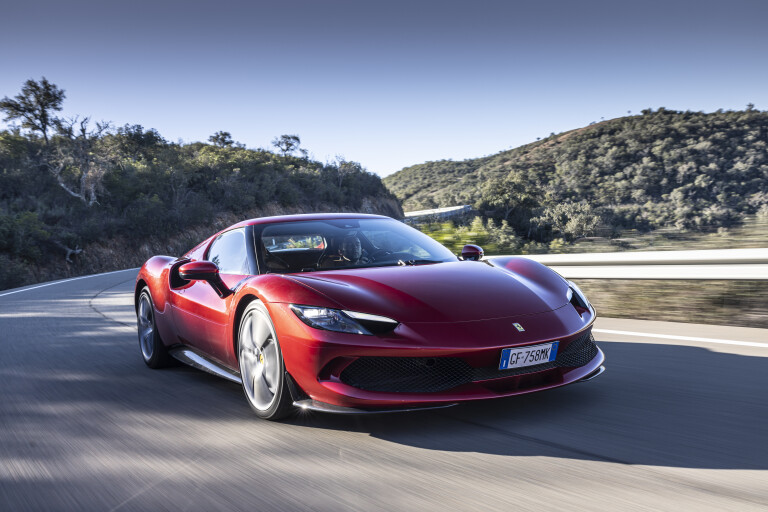
Though it wears a Ferrari badge, the Ferrari 296 GTB is above all a delivery vehicle. This is the car created to carry the company's most important new road-car engine in decades into the arena.
Codenamed F163, this V6 will power who-knows-how-many future Ferraris (see below). And for its first appearance, Maranello has chosen to demonstrate that less, done their way, is more.
The electrified 3.0-litre engine of the 296 GTB isn't just a little more powerful than the 3.9-litre V8 of the F8 Tributo, it's a lot more. While its 80kW advantage isn't the only factor at work, the 296 GTB also cuts a significantly quicker lap of Ferrari's famed Circuito di Fiorano test track. Reflecting its place in the performance pecking order, the 296 GTB is priced above the F8 Tributo.
Judged by numbers alone, the 296 GTB is a pretty persuasive introduction to the F163. Which is surely what Ferrari was aiming to achieve.
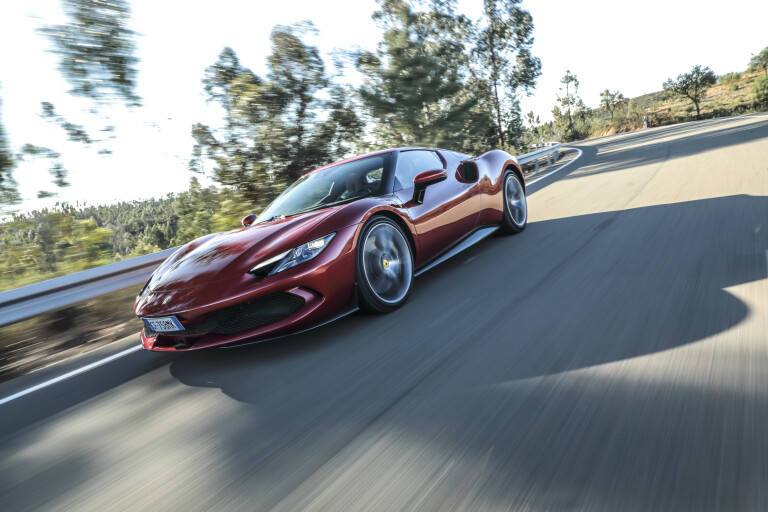
According to Ferrari engineers, the V6 was conceived, designed and tested in unelectrified form before being assigned to the 296 GTB project. And only at this time was the decision taken to make the F163 the centrepiece of a plug-in hybrid drive system with V8-beating power.
The F163 is an unusual V6, and not only because it's the first one in a Ferrari road car (the Dino-badged 206 and 246 from the '60s and '70s don't count, argue Maranello's PR people, and you might agree with them… or not).
First of all, the angle between its cylinder banks is 120 degrees; 60- or 90-degree angles are the norm for V6s. This arrangement has many advantages. Each pair of cylinders in the vee is connected to a single crankpin, meaning its crankshaft is very compact. Bore and stroke dimensions, by the way, are the same as in the SF90 Stradale's 4.0-litre V8. But the bare F163 V6 is more than 80mm shorter than any member of Ferrari's current F154 V8 family, say the engineers.
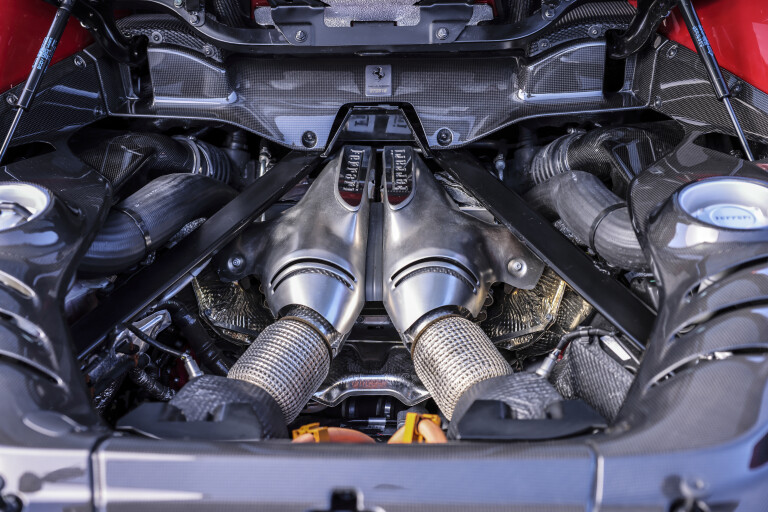
The new V6 layout also delivers evenly spaced firing intervals. As well as providing optimal exhaust gas flow to each of the engine's two turbos, this arrangement should – in theory – create a harmonious exhaust sound.
In another first for a Ferrari road car, the F163's turbochargers are located in the shallow and spacious valley between the cylinder banks. This makes it a hot-vee engine. The IHI turbochargers are mirror images of each other, so their turbine and compressor assemblies spin in opposite directions. Their upper rev limit has been increased to 180,000rpm, more than in Ferrari's V8s, improving boost efficiency. The turbines and compressors are slightly smaller and lighter, too.
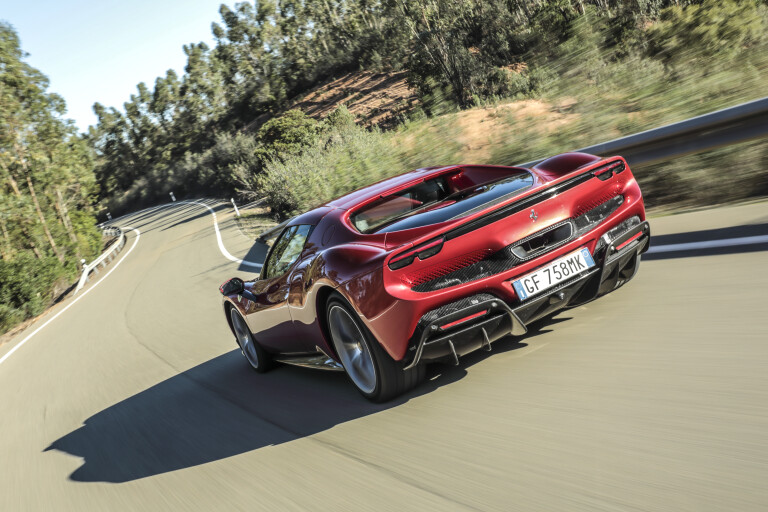
One aesthetic side-effect of the switch to a hot-vee layout is that there are no crackle-painted inlet air plenums to admire beneath the 296 GTB's engine cover. The V6's intake manifolds aren't only completely hidden from view below the widely splayed cylinder heads, they're made from black plastic.
Looking into the engine compartment, a shapely, shiny shield bearing the Ferrari name and concealing the turbochargers is the focus point. From here the exhaust system makes a short, straight journey to the 296 GTB's single central outlet.
The F163 is an unusual V6 … the angle between its cylinder banks is 120 degrees. The vee is connected to a single crankpin, meaning its crankshaft is very compact
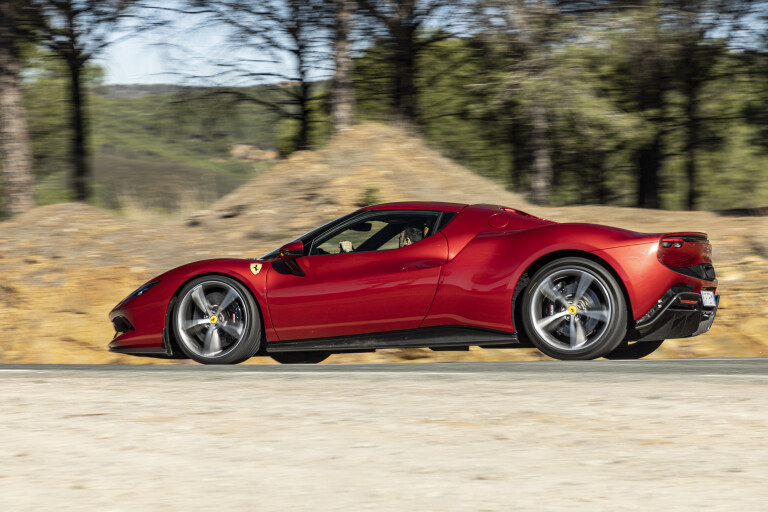
The sound? It's not like any other V6 you've ever heard, but it is definitely the kind of noise a Ferrari is expected to make. From a menace-laced rasp in the middle of the rev range, the note rises to a melodic wail as the tachometer twists through the top third of its arc to the 8500rpm redline.
Although from outside the 296 GTB can seem muted, from the driver's seat the sound is urgent, angry and plenty loud enough when driving hard. The exhaust isn't the only source of audio entertainment. There's accompaniment from the turbochargers, which add whistles and whooshes. If it all seems orchestrated to please the ear, it's because Ferrari took particular care to make it this way.
The melodic drama is an apt soundtrack for the 296 GTB's epic acceleration. It's not only that there's more raw thrust than Ferrari's rather special V8, the way it's delivered is different, thanks to the Ferrari's electric motor. It adds the kind of instant energy kick to the bottom and middle of the rev range that turbos cannot. The result, as perceived by the driver, is exact, exciting and altogether excellent throttle responsiveness right where it's wanted.
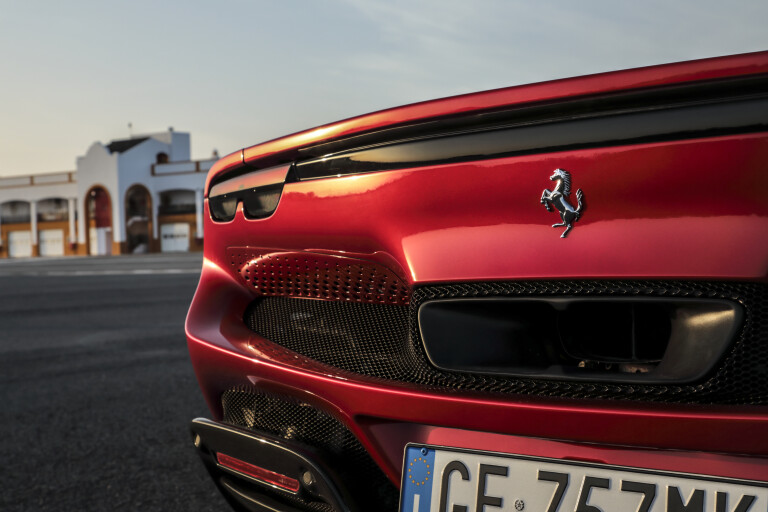
Although there's a close relationship between the electric motors found between the engine and transmission of the all-wheel-drive SF90 Stradale – Ferrari's first-ever plug-in hybrid – and the rear-drive 296 GTB, they're not identical.
Both are compact axial-flux units made by British company Yasa (recently bought by Mercedes-Benz), but the 296 GTB's motor punches harder. Its higher maximum torque output of 315Nm requires an uprated inverter to supply the extra energy.
The sound? It's not like any other V6 you've ever heard, but it is definitely the kind of noise a Ferrari is expected to make
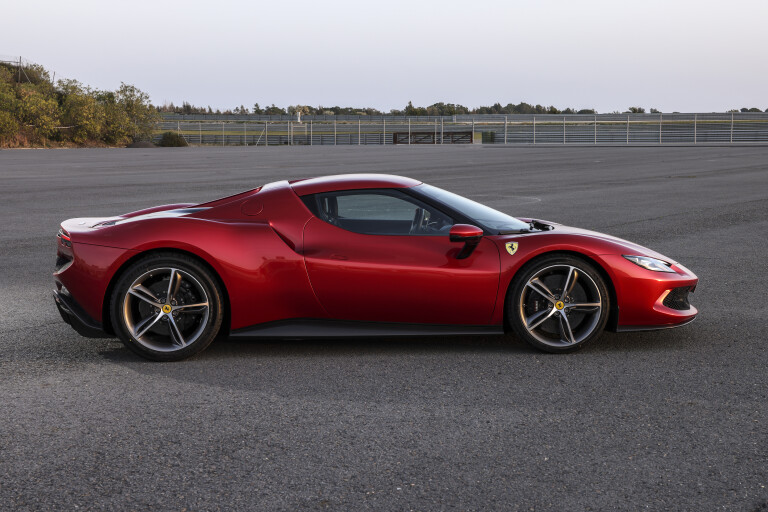
The other key alteration is the addition of a clutch between the 296 GTB's engine and its single electric motor. This is required to enable electric-only operation with the car's single motor by decoupling it from the V6. This isn't a requirement in the SF90 Stradale. It has three electric motors, using only the pair in its front axle for purely electric driving.
These also take care of going backwards in the SF90 Stradale, which doesn't have a reverse gear in its eight-speed dual-clutch gearbox. The 296 GTB uses the same transmission but equipped with a mechanical reverse.
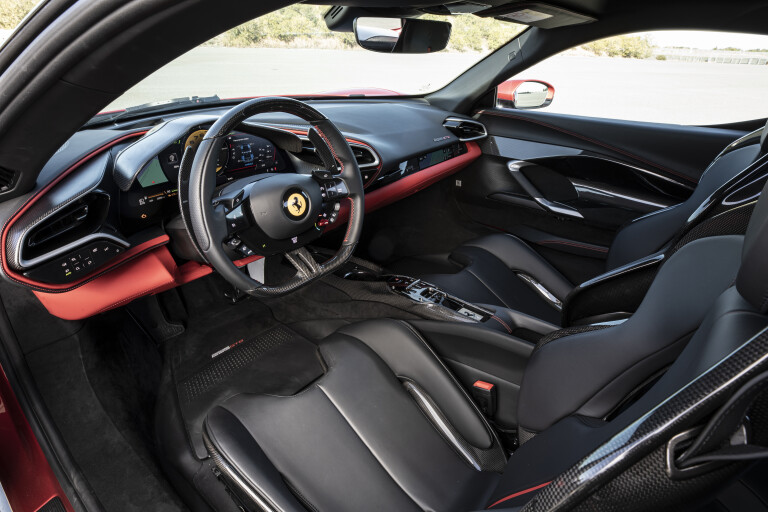
While Ferrari says its new V6 sportscar can drive around 25km using the 7.5kWh of energy stored in the 80 cells of its small lithium-ion battery pack, they admit its official WLTP-rated electric driving range will be more like 17km.
It is a paltry number compared to the latest mainstream plug-in hybrids, some of which have big enough battery packs to drive 100km electrically, and a pointer to Ferrari prioritising performance above almost all else with the 296 GTB.
Out of curiosity, I choose battery-power eDrive when it's time to trail the photographic car for a couple of slow laps of the Monteblanco circuit outside Seville in the south of Spain. Though the 296 GTB's electric motor maxes at only 122kW and top speed is limited to 135km/h, it's plenty for this job. And the fluid finesse of the gearshifting is kind of impressive.
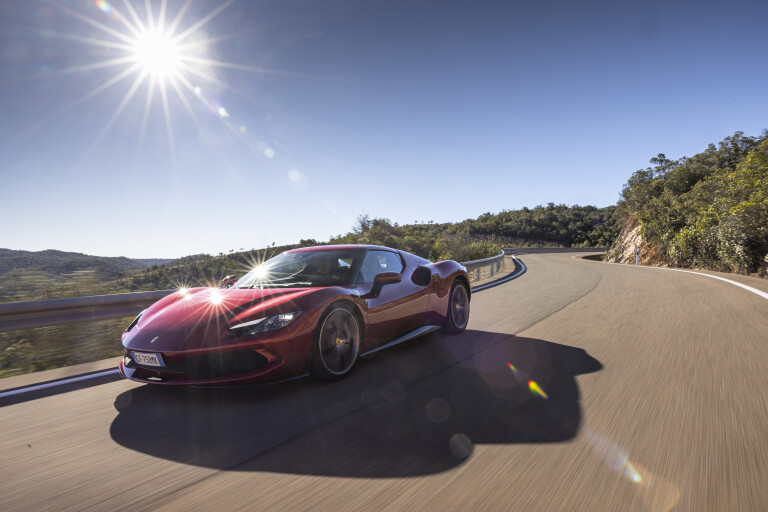
The car's default driving mode on start-up is Hybrid. Thumbing the starter button gets you a Prius-like 'Ready' light glowing silently in the instrument screen rather than the bark of the engine bursting to life.
The 296 GTB is an awful lot of car for a public road. The test loop Ferrari has chosen for this event heads into the hills of Andalucia. There's not a lot of traffic in this corner of Spain, and nothing I can't get by on the shortest of straights.
So I decide to analyse Hybrid mode. What's surprising is how frequently the Ferrari shuts down its engine … often on light throttle openings at open-road speeds
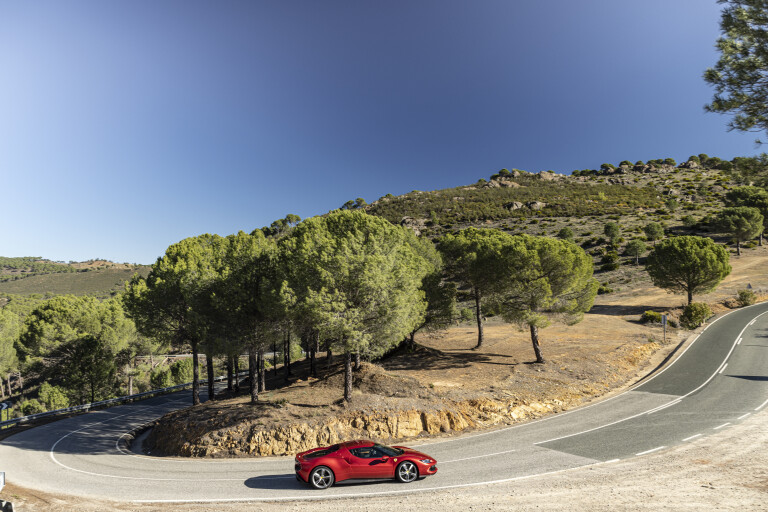
When I pull over for a breather, a BMW rider I've recently overtaken stops for a chat. My Spanish is minimal, like his English, but the motorcyclist is clearly well impressed by the 296 GTB's grace and pace. He wants a photograph, which reminds me of the several speed cameras the Ferrari people made a point of mentioning during the pre-drive briefing.
So I decide to take it easy from here and analyse Hybrid mode. What's surprising is how frequently the Ferrari shuts down its engine. It doesn't do it only when ambling through villages with 30km/h or 50km/h speed limits. Often it happens on light throttle openings at open-road speeds, especially if the gradient is a little or a lot downhill. In this mode, the 296 GTB is going to be very fuel-efficient… for a supercar.
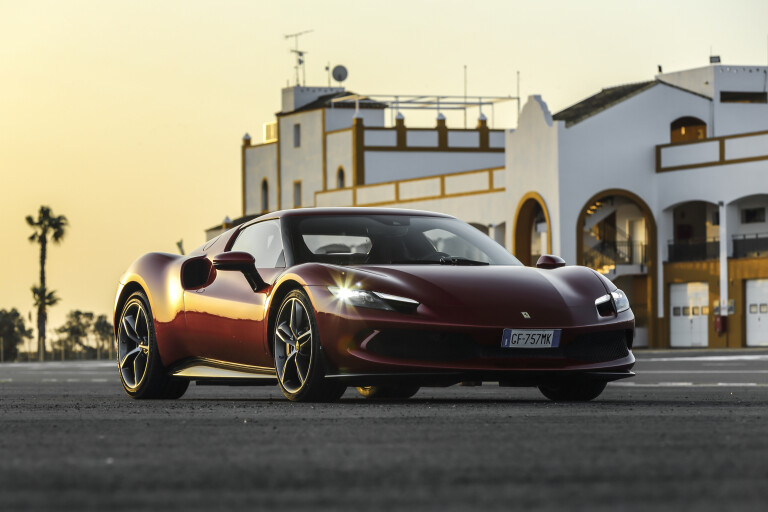
The battery pack's state of charge has an effect, too. When the SOC is very low the car will harvest some of the internal combustion engine's power to recharge the battery enough to cover demand for maximum performance. Load-point shifting is what the engineers call it.
Driver control of the 296 GTB's powertrain is via the e-manettino in the lower left quadrant of the steering wheel boss. The four touch-sensitive switches, from the bottom up, are eDrive, Hybrid, Performance and Qualifying. Maximum system power is available only in Qualifying, and only so long as the battery pack's SOC is high enough to support maximum power from the axial-flux electric motor. Performance, in contrast, constantly manages SOC to deliver a level of performance that's sustainable.
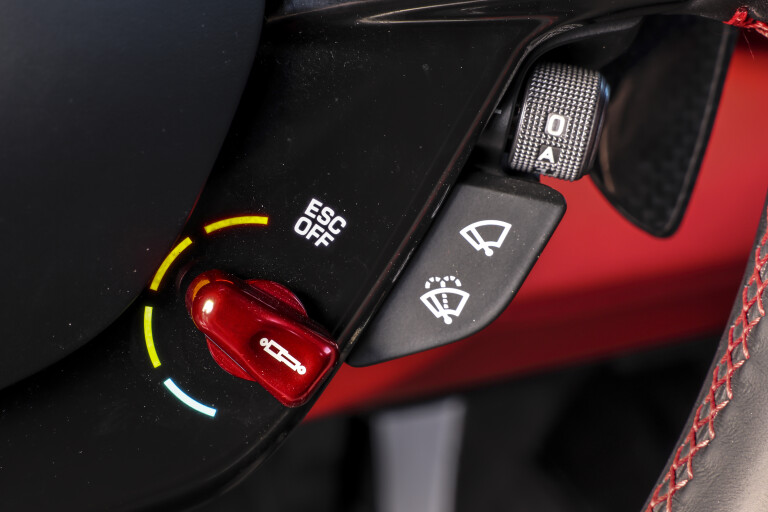
For laps of Monteblanco in an Assetto Fiorano-kitted car wearing stickier Michelin Pilot Sport Cup 2R tyres (rather than the Pilot Sport 4S rubber of the base 296 GTB driven on the road), Performance is what I choose.
The classic Ferrari dynamic manettino in the lower right quadrant offers a choice of Wet, Sport, Race, CT Off and – for only the very skilled or very foolish, and a place I'm not going – all off.
Quick, precise and perfectly weighted, the steering is superb. No surprise here, as the 296 GTB has the same steering rack as the SF90 Stradale
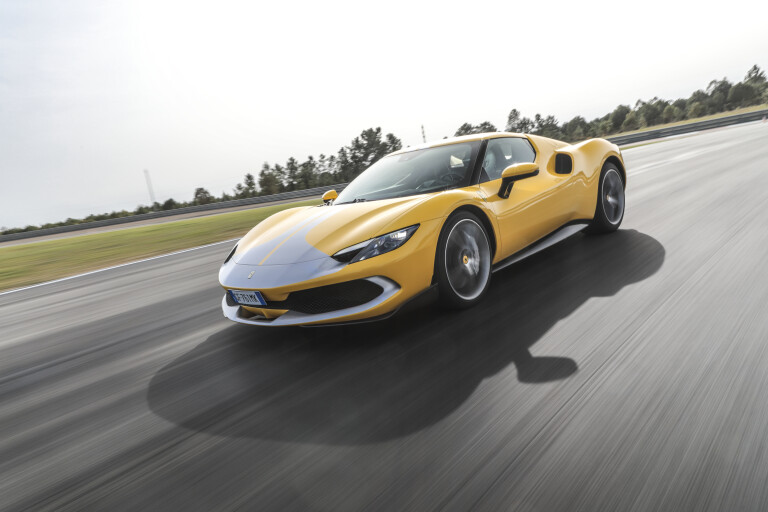
Compact engine, compact car; the wheelbase of the 296 GTB is 50mm shorter than Maranello's current mid-engine V8 models. And it's also the first Ferrari to feature a number of significant tech upgrades. The most important of these is a more advanced ABS calibration. In manettino Race mode or above, more exact calculation of the grip level of each wheel enables an increase in overall braking force.
Ferrari's stated objective with the 296 GTB was to exploit the opportunities offered by new dimensions and technology to create something agile and fun to drive. Well, they all say that, don't they. But few, if any, of them succeed like Ferrari has with its V6 plug-in hybrid. Even more than the SF90 Stradale, the 296 GTB makes its extraordinary performance and handling easily accessible.
My respect for Ferrari's expertise in creating software that tames the hardware, but not the driving experience, was already immense. The 296 GTB raises it another notch.
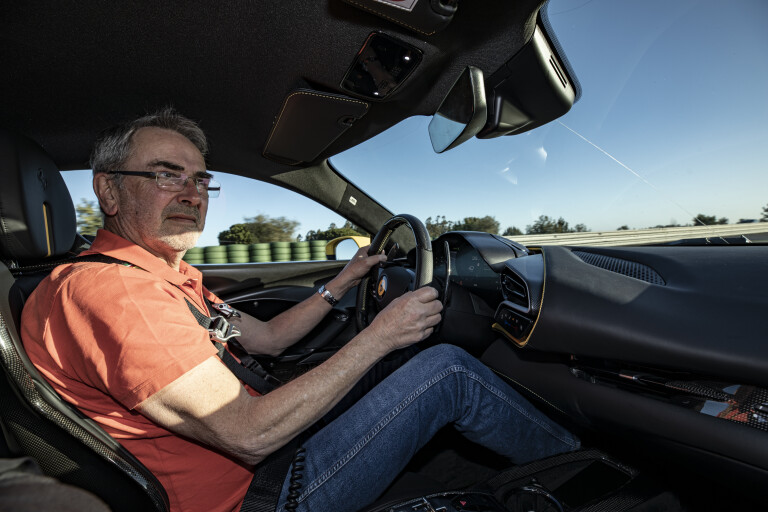
Quick, precise and perfectly weighted, the steering is superb. No surprise here, as the 296 GTB has the same steering rack as the SF90 Stradale.
The brakes are even more impressive. Slowing late and hard in Race mode, the 296 GTB allows a little sideways to be added to the cornering equation. In this car it's not a prelude to disaster, just a satisfying signal that every iota of grip is being exploited.
It's the same accelerating away from a corner. The 296 GTB will oversteer. Obviously. It's rear-drive, hugely powerful, and Michelin's men are not magicians able to conjure infinite grip. Don't be daunted. Go there, and you'll find this fierce Ferrari is friend not foe.
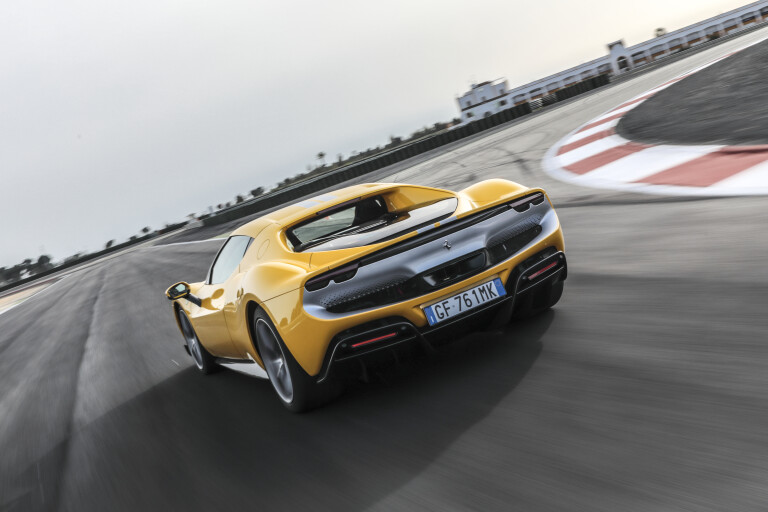
And there are looks to go with the personality. In both profile and rear three-quarter view (its best angle, according to a Ferrari designer who worked on it, and I agree) the 296 GTB echoes the famed 250 LM of the 1960s.
The tapered nose of the car sidesteps generic Ferrari sportscar blandness thanks to intriguing details like the brake cooling duct inlets adjacent to the headlights and the 'tea tray' aero aid incorporated in the bottom centre section of the front bumper. The overall effect is a very nicely judged blend of elegance and aggression.
The 296 GTB will oversteer. Obviously. Don't be daunted. Go there, and you'll find this fierce Ferrari is friend not foe
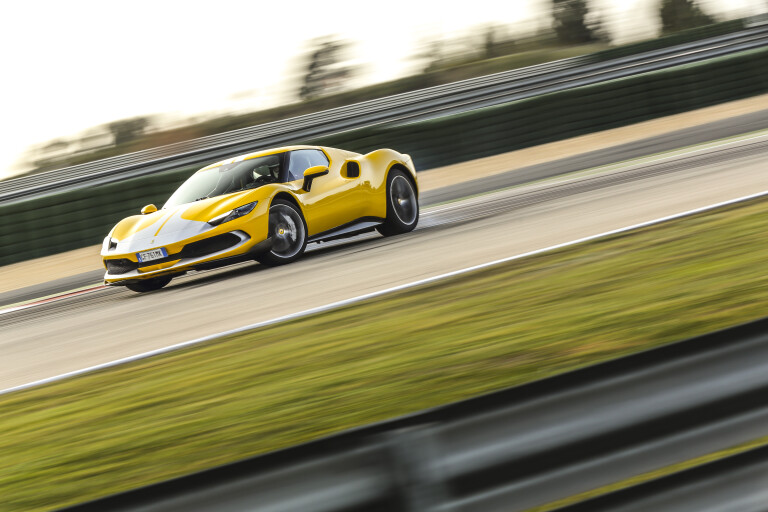
The snug-fitting cabin of the 296 GTB uses many of the same components already seen in the SF90 Stradale and the Roma, and sticks with similar design themes. The materials, quality and design of the interior create an environment worthy of the badge, meaning it's a big improvement compared to Ferraris of not so long ago.
Inevitably there will be those who doubt even Ferrari can create a 3.0-litre V6 plug-in hybrid that's as satisfying to drive as it is desirable. The 296 GTB is a message that they're wrong… special delivery from Maranello.
Ferrari's V6 future
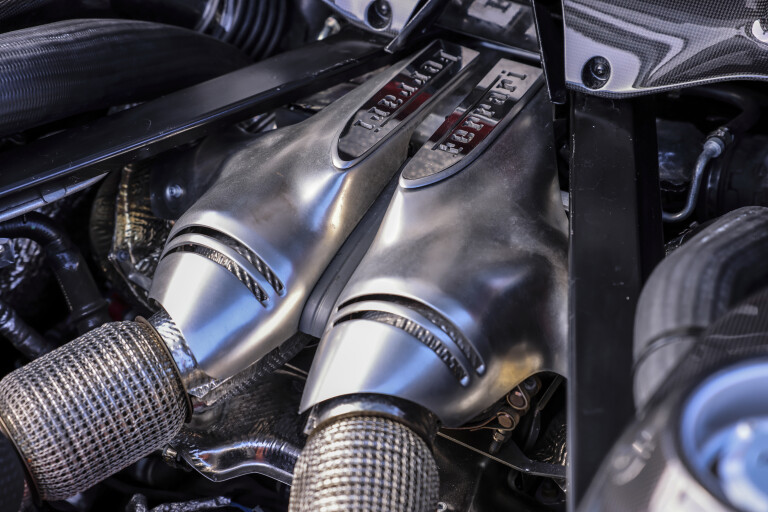
Where next for the new V6 introduced in the 296 GTB? While Ferrari engineers will never discuss future models, they do drop hints.
"This kind of engine is very versatile," says senior engine development engineer Emanuele Fresia, who worked on the F163. "It's a strong point for us for the future."
Read that as confirmation we'll be seeing more of this engine, and not necessarily in electrified hybrid form.
The engineer reveals that the V6 existed before the 296 GTB program was given the go-ahead by Ferrari management. "In this particular case, the engine was born before the vehicle project."
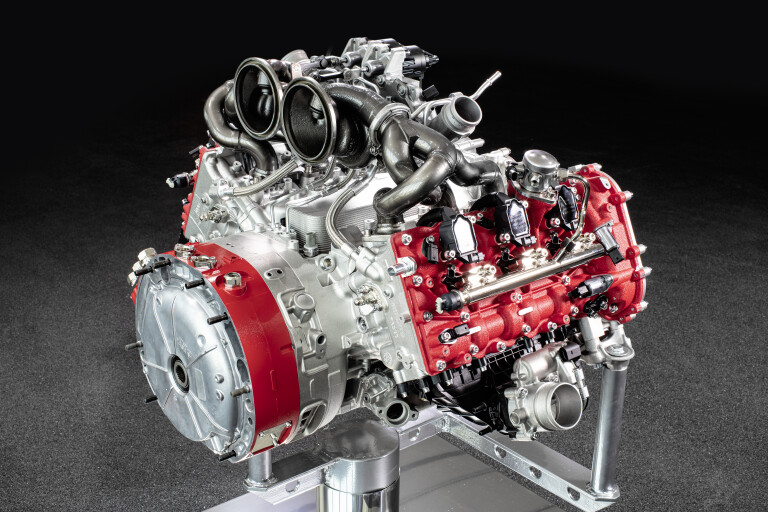
Until this point, the F163 was not electrified. And there's nothing to stop Ferrari producing the engine in non-hybrid form. "Yes. It could be, yeah," says Fresia.
In the 296 GTB, the hybrid system's powerful electric motor also serves as the V6's starter motor. Not a problem, says Fresia's colleague Andrea Giacomini. With "some little modification" it could be done.
Until this point, the F163 was not electrified. And there's nothing to stop Ferrari producing the engine in non-hybrid form
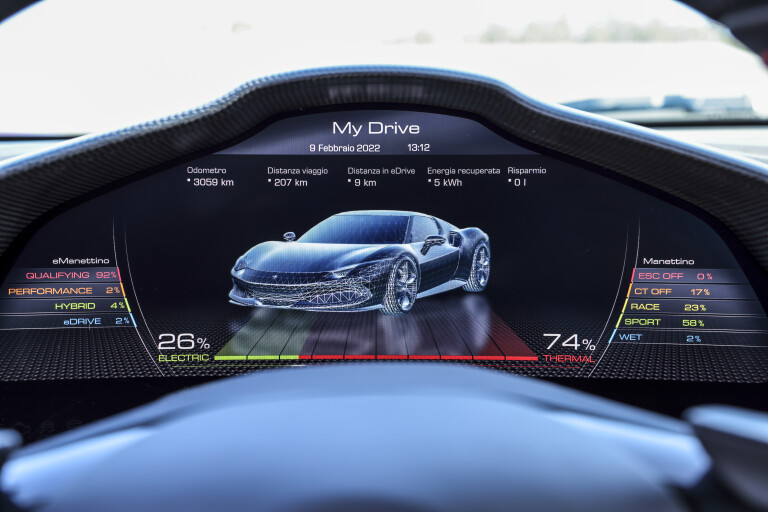
The bigger question is exactly what role the V6 will play in Ferrari's future. In both hybrid and non-hybrid forms, it can produce enough power and torque to take the place of the V8.
Or there's an alternative scenario, one that's perhaps more likely. Electrifying the V8, F163 style, would increase its outputs to a level well above the V6's. And this would make it a potential replacement for the non-turbo V12, currently Ferrari's oldest engine.
2022 Ferrari 296 GTB specifications
| Engine | 2992cc V6 (120 degrees), dohc, 24v, twin turbos |
|---|---|
| Power | 488kW @ 8000rpm |
| Torque | 740Nm @ 6250rpm |
| Electric motor | 3-phase axial-flux, single stator, dual rotors |
| Motor power | 122kW |
| Motor torque | 315Nm |
| Combined output | 610kW @ 8000rpm |
| Battery | 7.5kWh |
| Transmission | 8-speed dual-clutch auto |
| 0-100km/h | 2.9sec (claimed) |
| Weight | 1470kg |
| L/W/h | 4565/1958/1187mm |
| Wheelbase | 2600mm |
| Price | $568,300 + on-road costs (Assetto Fiorano $641,599) |
| On sale | Q4 2022 |



COMMENTS